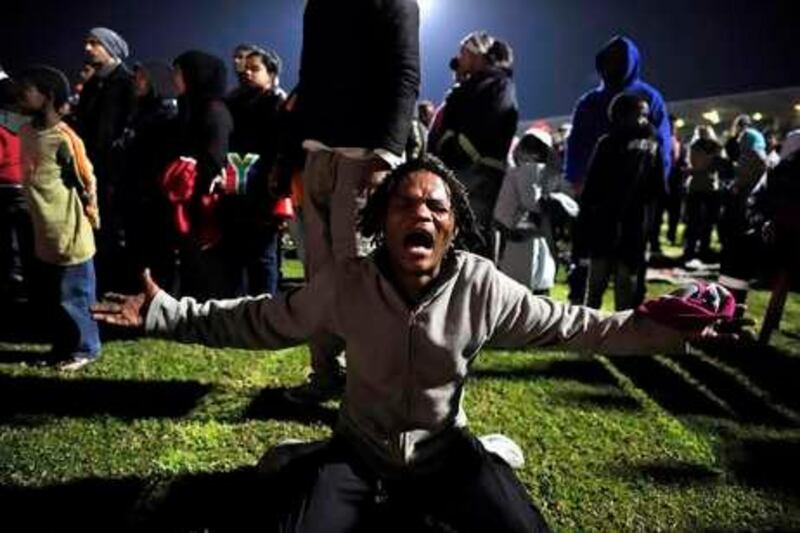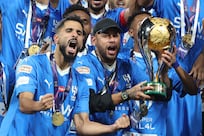JOHANNESBURG // For several weeks, the air of even Johannesburg's up-market northern suburbs was regularly pierced throughout the day by the blast of vuvuzelas as South Africans embraced the World Cup and built up their hopes of sporting success. But since the national side, Bafana Bafana, was humiliated 3-0 by Uruguay last week the plastic horns have fallen silent.
Flag vendors, once ubiquitous at road junctions in the country's economic capital, are now substantially less common, and the mood of excitement has in places been replaced by despondency. "It took six years to build for the World Cup and six days for the dream to implode," wrote Mark Gleeson in South Africa's Mail and Guardian newspaper after the defeat by Uruguay left Bafana Bafana's hopes "resting on the near impossible".
"South Africa now becomes like a waiter at a glittering banquet," he added, "inside the hall but unable to sup from the table." Despite the implosion of their final group-stage opponents France, South Africa can now only qualify for the knockout stages via an improbable combination of results tonight. At a minimum, it needs to conquer Les Bleus, scoring three times. Plus either Mexico or Uruguay must win in the other match, with the total margin of victory in the two games being at least five.
One commentator, Rapule Tabane, suggested that South Africans had been overly-optimistic about their side's prospects in the first place, "conflating their excitement about hosting the World Cup and the nation-building euphoria with a misguided belief that they could actually pull off miracles on the pitch". Dejected South Africans have been forced to throw their support behind other teams from the continent, but their hopes have not received a big boost there, either. Of the other African teams only Ghana, which top Group D and need a draw against Germany in their last match to go through, have their fate in their own hands. Among the others, Cameroon have already been eliminated and while Nigeria, Ivory Coast and Algeria could mathematically still qualify, there is a real possibility that there will be no African teams at all in the second stage, for the first time since the 1982 finals in Spain.
Still, given that it is the first time the tournament has been held on the continent and it was dubbed even by Fifa as an "African World Cup", many supporters are disappointed by the results, despite occasional highlights such as Algeria holding England to a draw. Nigeria, for instance, are nicknamed the Super Eagles but were dubbed the Super Turkeys in at least one report on their defeat by Greece. The effect is reinforced by the fact that African fans willingly embrace teams from the rest of the continent when they are facing opposition from elsewhere.
In the Mail and Guardian Phathisani Moyo wrote: "Ghana and Ivory Coast remain the only African teams that have played with some conviction. But if truth be told, the dream of seeing an African team go further than the quarter-finals appears destined to remain just that - at least in this tournament." Instead, South Africans are having to be content with enjoying a renewed sense of national unity - football has long been a black-dominated sport but whites too have embraced Bafana Bafana - and the fact the world's football party is being held in their country.
Niggles over transport, the occasional criminal incident and embarrassment over a marketing stunt aside, it has so far been a resounding success, and the doom-laden predictions of some western media outlets have gone unfulfilled. "The point is to host, not to win," Business Day headlined an editorial, describing it as "an incredible victory we have already achieved" and the global publicity as "absolutely beyond measure".
"Good memories are a more powerful antidote to Afro-pessimism and negative reporting than any government could buy," it said. foreign.desk@thenational.ae





